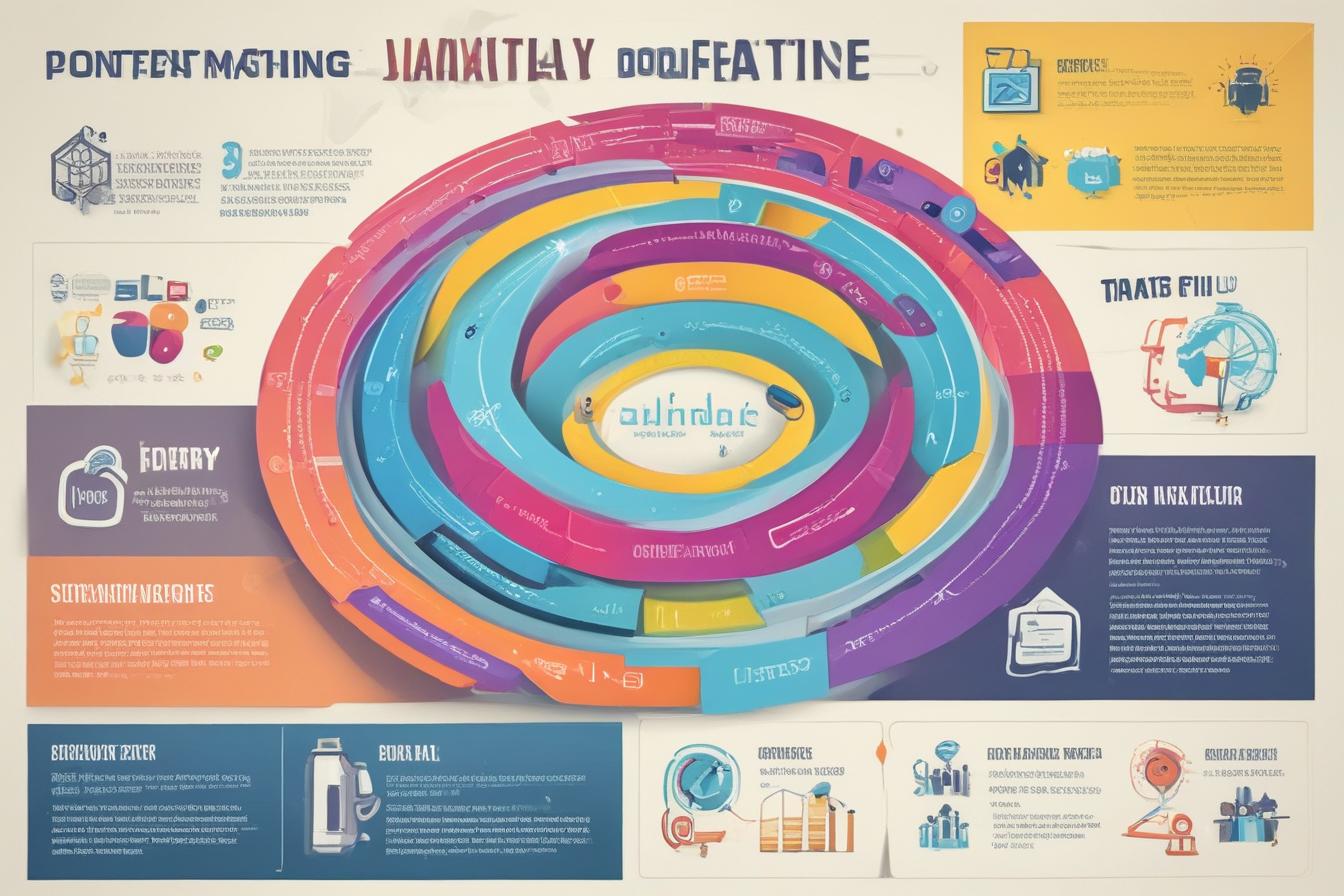In the ever-evolving digital landscape, content marketing has emerged as a powerful strategy for businesses to connect with their target audiences, establish thought leadership, and drive conversions. The content marketing industry is thriving, and its significance continues to grow as more companies recognize the value of creating and distributing valuable, relevant, and consistent content.
What is Content Marketing?
Content marketing is a strategic approach that focuses on creating and sharing valuable, relevant, and consistent content to attract and retain a clearly defined audience, ultimately driving profitable customer action. It involves various forms of content, such as blog posts, articles, videos, podcasts, infographics, and social media updates, designed to address the specific needs and interests of the target audience.
Purposes of Content Marketing
- Building brand awareness and authority
- Engaging and nurturing prospects through the buyer’s journey
- Fostering customer loyalty and retention
- Driving website traffic and lead generation
- Improving search engine rankings and online visibility
Benefits of Content Marketing for Businesses
Content marketing offers numerous benefits for businesses across various industries. By consistently delivering valuable and relevant content, companies can:
Establish Thought Leadership
Businesses can position themselves as subject matter experts by creating informative and insightful content that addresses their audience’s pain points and provides solutions.
Improve Brand Perception
High-quality content helps shape a positive brand image, fostering trust and credibility with potential and existing customers.
Enhance Customer Relationships
Content marketing allows businesses to engage with their audience, address their questions and concerns, and strengthen customer relationships throughout the buyer’s journey.
Drive Lead Generation
By offering valuable content, businesses can attract and nurture leads, guiding them through the sales funnel and increasing conversion rates. Tools like ContentScale.fr can help generate SEO-optimized content at scale, enabling businesses to produce high-quality content more efficiently and cost-effectively.
Content Marketing Industry Trends in 2023
The content marketing industry is constantly evolving, and staying ahead of the curve is crucial for businesses to remain competitive. Here are some significant trends shaping the industry in 2023:
Personalization and Hyper-Targeting
With the abundance of content available, personalization and hyper-targeting have become critical for businesses to deliver relevant and tailored experiences to their audiences.
Emphasis on Interactive and Immersive Content
Audiences crave engaging and interactive experiences. Businesses are leveraging immersive technologies like augmented reality (AR), virtual reality (VR), and interactive videos to captivate their audiences.
Rise of Artificial Intelligence (AI) and Automation
AI and automation are revolutionizing content creation and distribution. Tools like ContentScale.fr use AI to generate SEO-optimized content at scale, saving businesses time and resources while ensuring high-quality output.
Increased Focus on User-Generated Content (UGC)
UGC, such as customer reviews, testimonials, and social media posts, is gaining traction as a powerful form of authentic and trusted content.

Developing a Successful Content Strategy
To maximize the effectiveness of content marketing efforts, businesses must develop a comprehensive content strategy aligned with their overall marketing goals. Here are some key steps to consider:
Define Your Target Audience
Clearly understand your target audience’s demographics, interests, pain points, and preferences to create content that resonates with them.
Set Clear Goals and Objectives
Establish specific, measurable goals for your content marketing efforts, such as increasing brand awareness, generating leads, or improving customer engagement.
Conduct Thorough Keyword Research
Identify the keywords and phrases your target audience is searching for to optimize your content for search engines and ensure discoverability.
Develop a Content Calendar
Plan and organize your content creation and distribution efforts by creating a content calendar that aligns with your marketing campaigns and promotional activities.
Leverage Multiple Content Formats
Diversify your content offerings by incorporating various formats, such as blog posts, videos, infographics, and podcasts, to cater to different audience preferences and consumption habits.

Content Creation: Types, Tools & Tips
Effective content creation is at the heart of successful content marketing. Businesses can leverage various content types and tools to produce engaging and valuable content for their audiences.
Content Types
- Blog posts and articles
- Videos (explainer videos, product demos, interviews)
- Infographics and data visualizations
- Podcasts and audio content
- Whitepapers and e-books
- Social media updates and stories
Content Creation Tools
Businesses can leverage various tools to streamline their content creation processes, such as:
- Content management systems (CMS) like WordPress, HubSpot, or Wix
- AI-powered content generation tools like ContentScale.fr
- Graphic design tools like Canva or Adobe Creative Cloud
- Video editing software like Adobe Premiere Pro or Final Cut Pro
- Social media management tools like Hootsuite or Buffer
Content Creation Tips
- Focus on providing value and addressing your audience’s needs
- Optimize content for search engines with relevant keywords and meta tags
- Incorporate visuals like images, videos, and infographics to enhance engagement
- Encourage shares and interactions through calls-to-action (CTAs)
- Repurpose and update existing content to maximize its lifespan

Measuring Content Marketing ROI & Analytics
Measuring the effectiveness of content marketing efforts is crucial for refining strategies, optimizing performance, and demonstrating return on investment (ROI). Here are some key metrics and analytics to track:
Website Traffic and Engagement
Analyze website traffic sources, bounce rates, page views, and time on site to understand how your content is driving visitors and engagement.
Lead Generation and Conversion Rates
Track the number of leads generated from your content, as well as the conversion rates from leads to customers, to assess the impact of your content on sales and revenue.
Social Media Metrics
Monitor social media metrics like likes, shares, comments, and follower growth to gauge the effectiveness of your content in building brand awareness and fostering community engagement.
Search Engine Rankings
Track your content’s rankings for relevant keywords to evaluate its impact on search engine visibility and organic traffic.
Content Performance Analytics
Analyze metrics like pageviews, time on page, and bounce rates for individual pieces of content to identify top-performing assets and optimize future content creation efforts.
By continuously monitoring these metrics and analyzing the data, businesses can make data-driven decisions, refine their content strategies, and maximize the ROI of their content marketing investments.

Future of Content Marketing: AI, Personalization & More
The content marketing industry is poised for significant advancements driven by emerging technologies and evolving consumer expectations. Here are some key trends shaping the future of content marketing:
Artificial Intelligence (AI) and Automation
AI and automation will play an increasingly prominent role in content creation, optimization, and personalization. Tools like ContentScale.fr leverage AI to generate SEO-optimized content at scale, enabling businesses to produce high-quality content more efficiently and cost-effectively.
Personalization and Hyper-Targeting
Advancements in data analytics and machine learning will enable businesses to deliver highly personalized and hyper-targeted content experiences, tailored to individual preferences and behaviors.
Immersive and Interactive Content Experiences
Virtual and augmented reality, as well as interactive technologies like 360-degree videos and gamification, will become more prevalent, offering immersive and engaging content experiences.
Voice Search Optimization
With the rise of voice assistants and smart speakers, optimizing content for voice search will become increasingly important to ensure visibility and discoverability.
Emphasis on Privacy and Trust
As consumer concerns over data privacy and online security grow, businesses will need to prioritize transparency, ethical data practices, and building trust with their audiences.
By embracing these emerging trends and technologies, businesses can stay ahead of the curve and deliver exceptional content experiences that resonate with their audiences and drive tangible business results.
In conclusion, the content marketing industry is thriving, and its significance is only set to grow as businesses increasingly recognize the power of valuable, relevant, and consistent content. By developing a comprehensive content strategy, leveraging various content formats and tools, and continuously measuring and optimizing performance, businesses can effectively engage their audiences, establish thought leadership, and drive conversions.
To stay ahead of the competition and maximize the impact of your content marketing efforts, consider leveraging tools like ContentScale.fr. This AI-powered platform enables businesses to generate SEO-optimized content at scale, saving time and resources while ensuring high-quality output.
Embrace the future of content marketing, where AI, personalization, and immersive experiences will shape the way businesses connect with their audiences. Stay agile, innovative, and data-driven, and you’ll be well-positioned to thrive in the dynamic content marketing landscape.
